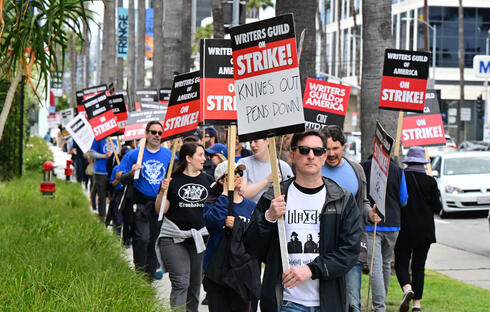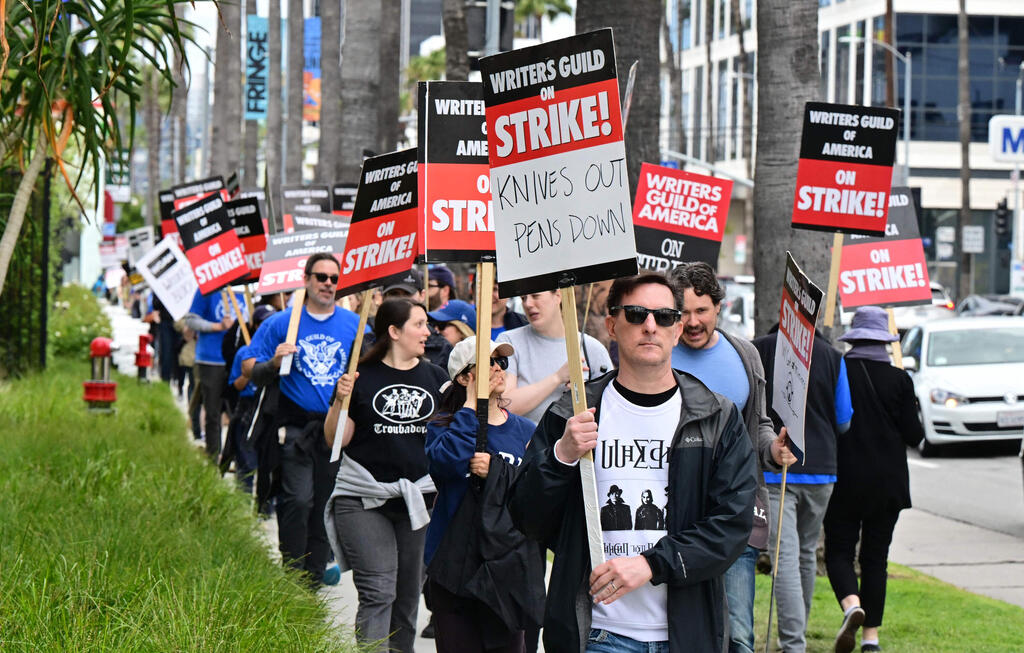
AI in the entertainment industry: Writers Guild victory sets a new standard
How the Writers Guild's strike led to a landmark agreement addressing AI's role in content creation
In the war of man against machine, for now it appears that man has won. Hollywood studios and the Writers Guild of America, which went on strike for five months - the longest strike in its history - concluded an agreement that artificial intelligence will not steal credit or income from human screenwriters. The AI clause, which is unprecedented in the history of contracts between the Writers Guild of America and Hollywood studios, is expected to have implications for future labor disputes related to AI usage.
The agreement, signed for the next three years and announced recently, shows that the guild members have achieved nearly everything they fought for, including salary increases, royalties, a minimum number of screenwriters in writers' rooms, and clear guidelines regarding the use of artificial intelligence. The latter is particularly significant not only because of the new AI technology involved but also due to the early acknowledgment of its role.
This is a significant achievement, as the rules are now established precisely at a time when tools like ChatGPT are becoming commonplace. The new agreement states that AI shall not write or be credited for literary material. Additionally, material created by artificial intelligence shall not take credit or copyright from screenwriters. According to the agreement, screenwriters can use artificial intelligence when providing writing services, but only with the consent of production partners, and they cannot be compelled to use AI. Studios must disclose to writers if AI-generated material is used, and using scripts by writers to train AI is prohibited.
The importance of this agreement concerning artificial intelligence extends beyond the entertainment industry, as it could serve as a precedent for future negotiations in other fields related to intellectual property. Actors, who are still on strike, are also concerned about this issue. The use of AI in all areas related to intellectual property, such as publishing and journalism, has become a central topic in all new contracts.
Similarly, a lawsuit was filed by a group of authors, including Jonathan Franzen, John Grisham, George R. R. Martin, and Jodi Picoult, against OpenAI, accusing the company of copyright infringement, by using their books to train ChatGPT without permission or providing compensation. Over a dozen authors have filed the lawsuit against the company, in which Microsoft has invested billions of dollars, alleging copyright infringement. In the authors' lawsuit, it is claimed that OpenAI's chatbots can now create "derivative works" that can mimic and summarize their books without seeking permission or providing compensation to the authors. The lawsuit states, "The success and profitability of OpenAI are based on wholesale infringement of copyright without seeking permission and without paying a cent to the authors. These algorithms represent systematic theft on an enormous scale."
Adam Seth Litwin, a professor at Cornell University specializing in labor rights, wrote in the New York Times that "everyone, from auto workers to white collar managers, needs to pay attention to the agreement reached between screenwriters and studios because it is a landmark precedent for labor relations in the digital age." Unlike issues like wages and social benefits, which are defined as "bread and butter" topics, the use of technology, including artificial intelligence, has always been in a gray area that could be negotiated. "The Writers Guild is putting this issue front and center."
"In the past, executives made almost all decisions related to technology long before negotiations began. Workers and their unions were never included in early conversations about technology," he writes. Many were skeptical about the screenwriters' ability to reach an agreement on this issue and were surprised by their success. What has been agreed upon is even more important: "Artificial intelligence is not a screenwriter's stronghold. Studios can rely on AI to create a first draft, but the writers who polish it will receive the credit. These writers will receive the same minimum salary they would have received if they had written everything from scratch."
The agreement regarding screenwriters' rights and AI was likely reached because Hollywood studios have reason to be financially concerned about AI and copyright. After all, a creation written by artificial intelligence cannot be protected by copyright, and studios are often the owners or co-owners of these rights. By ensuring that credit for writing always goes to a human, even when AI is involved in the process, studios are also protecting their interests and, therefore, stand to benefit from this agreement.
Screenwriters are returning to work after securing additional salary increases and a new royalties model for streaming services following 148 days of striking, protests at building entrances, strict work stoppage compliance, and tense negotiations, following the unanimous vote of the union representatives in favor of the agreement. The place where this will be immediately felt is late-night talk shows, which relies on sharply written monologues. Series with actors will have to wait a bit longer, as the actors' strike, which their guild joined in mid-July (two months after the start of the screenwriters' strike), is still in effect.
The wage agreement includes a 5% minimum wage increase as of the signing of the agreement. It will rise another 4% on May 2, 2024, and an additional 3.5% on May 2, 2025. Regarding residuals, a new payment model based on streaming service viewership has been agreed to, starting with projects airing on January 1, 2024. This means that streaming services will have to provide reliable and transparent, even if confidential, data to screenwriters regarding the success and viewership of their shows, and they will be compensated accordingly. Screenwriters have also received additional benefits in terms of pensions and medical insurance.














